
A N G E L S
Twelve episodes (plus one)
NORSK ENGEL
Two gigs
Can a rising pop star really be an angel?
The music, magic, many faces, & amazing grace
of Norway's Sondre Lerche
SONDRE
of Bergen
May & June 2003



THAT FACE
"You know so well,
things are easy to tell"
(Or are they?)
It began (as it so often does) with a face. In this case (as ever more often these days) a face first seen on TV. On a cold and late February night, aimlessly zapping up and down the channels, I am suddenly stopped by that face.
A boy. Singing.
It's a music video. On TFO, Ontario's public French educational network. I don't often stop there but for programs with subtitles. But wait: this boy is singing in English. And in black-and-white. The screen goes colour for scenes that seem your usual pop video, this variety Teen Girl in Trouble. With Boys. And her Mum. She is china-doll pretty.
But it keeps going back: to black-and-white; to that boy. He's in a bookstore. It's raining. (That girl looks in, but walks on.) He does bookstore things. But mostly he sings. Sitting sometimes, rocking as he strums a guitar; I do like the tune, his voice light and rich.
More often the screen is filled by that face: crop-headed, ears jutting out a bit, nose broad; his eyes are big, bright, intense. Words ease his mouth open wide: wrapping "well," his jaw makes a subtle jog sideways.
At the end he closes up shop (a sign hung in the door says "Stengt"; he had flipped it to "Åpent" when he arrived, but I didn't know that yet). With his guitar in its case slung down over his back, he strides to his bike (that girl walks by; he looks, she walks on), arcs a leg over, and pedals away. He looks small.
Who is this boy? Where is he? As he rides off I lean in: Will I get the usual squib -- title / artist / label -- bottom left? Yes. Just long enough to catch it: "you know so well / SONDRE LERCHE / virgin/emi."
I'd never heard of him. Nor heard that song.
But then, when I first saw a tall gawky guy with a wondrously strong face walking wet and alone on a beach, the vast sky behind him going (impossibly) from starlight to sunrise, I had never heard of Chris Martin. Or Coldplay. Or "Yellow." But... I was amazed.
That's what music videos are for: they're marketing tools, meant to grab you. And they have, on occasion, grabbed me. I once found Brian Littrell's odd boxy face so engaging that I bought a promo video for the Backstreet Boys, sitting cheap in a store window. I stick with every airing of Avril Lavigne, if less for her (though I do like brazen grrrls) than her Sk8tr Boi guitarist stage-left -- a succulent blond pup whose name I dug up (along with pics): Evan Taubenfeld.
But I've never actually bought an Avril CD. Or any by the Backstreet Boys. Cute goes only so far. I know the game: Brian -- like so many American pop stars, even those not former Mouseketeers -- never fails to end his award-show gushes with Thanks to Almighty God. That video I've since chucked. And that Evan, it seems, can be quite the Rude Boy. (Not that I always mind.)
But Coldplay? Yes. Amazement lingers. In rare moments, music videos can be more than mere promo. They can be art. When there are true artists behind them.
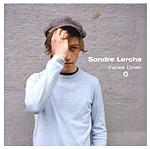
FACES DOWN
"When there is light from up above, then there will come a sacred dove to the basement, to the basement"
(To the basement?)
Astralwerks, 2002
Cover photo: Bjørn-Eivind Årtun. Art-direction & liner note photo below: Play (www.playpuppy.com -- worth checking out for other Norwegian artists whose works Sondre knows quite well).
Suspecting I had stumbled onto an artist, I Googled "Sondre Lerche." I found his website. And found I had seen a Norwegian pup singing in English on French-language TV. (Oh Canada, eh?) He was 20 years old. That song was his own: he had written it, and all the songs on his CD (recorded in 2000 if not released to the world beyond Norway 'til 2002), when he was still in high school.
I found Faces Down (Virgin Records Norway) was available in Canada and the USA on Astralwerks. I headed off to my local HMV. But I didn't know where it might be. I asked a sales clerk if she could check her screen -- for "Sawn-DRAY Ler-CHAY." I spelled it (correctly). "Alternative section," she said. I found it -- with a sticker conveniently correcting my pronunciation: SON-dreh LAIR-key.
But -- I didn't seem to recognize his face. I had seen lots of pictures on his website: lots of him (with lots of friends), many faces. But his face never seemed quite the same face. With longer hair his ears don't add their perky width; the nose, looking snub face-on, in profile turns ski-jump. The lips seem full. Or maybe not. That pup physiognomy can go hang-dog -- if, quite often, with a smile spread over a sharp stretch of stubbled chin.
So, even after all those photos, I still couldn't say I knew exactly what he looked like. Well, it didn't matter. (But then, maybe it does -- if in ways I had yet to ponder.) The face I imagined most his own showed up in a video interview on his site: sitting in jeans and a light blue T-shirt on a russet brown sofa, a red guitar standing ready; his easy voice offering up words of uncommonly good sense.
- "In my native Norway, I have gotten quite a lot of attention. So, coming outside Norway it was really ... refreshing. At first it was quite strange because nobody recognized my face. [He smiles a bit.] But then I realized that was of course quite natural, because nobody really cared who I was. I think that's quite healthy."
Like ABBA or Celine Dion, he sings not in his native language but in English. If not for quite the same reason. Sondre, unlike they, grew up with international (read mostly American) music TV. And a big sister into pop tunes -- which he's been "desperately into" since the age of four, "trying to write songs for ages and ages without really succeeding." By 13 he had one that felt to him "you know -- a song."
- "I started writing in English, and I think that's because, uh, I think I felt that the English language was such an important part of the tradition I wrote in. You know, it was supposed to be in English. Later on I tried writing in Norwegian -- which was really, really not good. I find the Norwegian language very ... unmusical in a way. It's very ... itchy. If you can say that about languages."
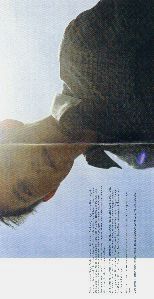
MANY THANKS
A very long list, in liner notes to Faces Down -- including many fellow artists on Bergen's music scene, "Mamma, Pappa ... and anyone who had a heart."
But it's music, not words, he begins with: "The lyrics often come from the melodies. I sit down and I start with chords and the melody, and you sing ba-ba-ba or la-la-la or whatever -- but then you bump into certain words, unconsciously. Maybe a sentence here, and you start rhyming without really knowing it. You're 'free-styling' or something."
Sondre first learned that free-style approach from HP Gunderson, music producer and fellow Bergen musician, whom he thanks in his CD's liner notes for "priceless friendship and guidance during the last four years."
- "Melody and harmony is really what I work for. Because I think, to me, that's really the basis of, you know, the most interesting thing: trying to make a melody that is both interesting -- and clear. And beautiful. And... and rich. I'm just trying to make melodies that ... that haven't really been there before, but are so clear that you might think they have, in a way."
He picks up his guitar to show us, with "Sleep on Needles," the first song he wrote for Faces Down. "That just started with a melody that I thought was quite... well, I don't know. Sometimes you are really a bad judge of what you do yourself. I didn't really care for it at all."
He plays it, dah-dahing along. "Which to me now is quite -- well! -- it's quite good. And it's also very..." -- his hand makes arcs in the air -- "it's only two chords. The melody goes quite a few places on only those two chords."
But he wasn't sure where it should go. "I'd really built up this expectation for a fanfare or... chorus or something. I can't come with 'chuh cha luh, la la, la la laaah!' That would sound like, you know, the Eurovision song contest or something. And what the world doesn't need is bad choruses, because there are so many of them."
- "So I thought, I'll have to come up with something that is... as good as -- and this is what I thought: I thought, I have to come up with something that is, that is -- as good as ABBA! Which really is a contradiction, because they were on the Eurovision song contest."
What he came up with soars. "And I think it's quite strange that nobody has done this melody before me because -- listen to it, it's only, it's" -- he sings it, just with guitar: at first just "daaah, da dah-daaah," then "sleeeep on neee-duls." The screen and soundtrack break into the rich complexities of that song's video, perhaps his most edgy Pop Rock piece.
Then he says: "It's as simple as that! And yet I don't know at all how I'm going to follow up that song."
Popping Faces Down into my CD player, I had no idea what to expect. But maybe Pop Rock. (Had I popped it into my iMac's CD-ROM drive I'd have got that face again. But I had yet to noticed tiny type on the back: "Includes video for You know so well & photo gallery viewable on your computer.")
What I got was "Dead Passengers" -- originally called "Faces Down." When Sondre saw that would make a good album title ("I had lots of bad titles"), he changed the first cut's to something "more cheerful."
It opens with subtle drums, wood-block clicks, bass guitar, rhythm later, and piano. Then that voice -- "When there is light, from up above" ... almost languid. You think maybe Bossa Nova, Burt Bacharach; there are strings, high back-up voices sailing along with a light "deh deh deh, deh deh dehh...." Sondre has been called a Norwegian lounge act.
But, just two minute in, the drums sharpen, those back-up gals get almost eerie, and Sondre's ease takes on edge: "But you / have been fooled / You knew the rules / by heart / There is / no guarantee / against infamy / out there."
Nearly every cut plays the same trick: opening chords set up easy, even comforting expectations -- and then you get odd flights, soaring bits, sharp riffs, sudden stops; sounds and words and senses all utterly unexpected. Perhaps mostly, the words:
-
"When there is fear you won't have to cry
napkins are here, they'll dry your eyes
and blind them, and blind them"
"Dead Passengers""I've changed, become another
The one you used to stalk is real
...But nothing stays the same
I am so amazed I am so amazed
That nothing stays the same
Nothing stays the same"
"On And Off Again""You can just call / I will pretend not to care
You'll pretend all / and I'll pretend you called
But no one's gonna come / tell you how it's done
tell you how it feels / 'till you come down
It doesn't work by itself
How come?"
"No One's Gonna Come"
Of his songs, he says: "Sometimes they could be melancholic or bittersweet, but they are always romantic. They are never depressing. Some of them tell a story in a clearer way than others."
A critic once said: the boy clearly needs to fall in love. She clearly had a tin ear: you can hear that he already had. As he tells it in the March / April 2003 issue of the New York interview mag index:
- "There is a trilogy of songs on the record that describes the rise and fall of a real relationship I had. ... 'You Know So Well' is about dying to tell someone what you're feeling, but fearing that all hell might break loose if you do. And 'No One's Gonna Come' is about the moment after you've declared yourself. ... 'Things You Call Fate' is about realizing that, unless you get smart about love, quickly, you're bound to repeat your mistakes."
All this in high school. If making of tentative romance at that tender age -- when, as Sondre has said, "you haven't got a clue how to handle it" -- words and music way beyond the usual high-school pop-radio schlock.
But Faces Down offers much more than, as another critic put it, "melodies that can break a heart at 50 paces." Some cuts are larky. Even silly: "All Luck Ran Out" -- based on media tales of small-town killers seen as "not mean, just cozy criminals" -- has a kid-chorus: "Nah nah nah nah naaaah!"
On "Modern Nature" Sondre and singer Lillian Samdal happily trade flirtatious barbs: "Do you have the slightest idea / No I don't / Why the world is bright when you're near? / Is that so?" I was reminded right away of Debbie Harry and Iggy Pop doing "Well Did You Evah (What a Swell Party This Is)" on Red, Hot & Blue, a 1990 tribute to Cole Porter.
Only later did I learn that Cole Porter is among Sondre's conscious inspirations. Along with Beck (he gets called Beckish), Steely Dan, Prefab Sprout, The High Llamas, The Beach Boys, David Byrne, Elvis Costello; a-ha, Norway's big pop export of the '80s. And, yes, Bert Bacharach.
Sondre's website includes -- as not a few pop sites do -- the artist's own personal diary. One can doubt how truly personal: PR flaks are skilled creators of an appealing, if proxy, "persona." But these online words seem Sondre's own. Like this, from April 11, 2003.
-
"This week has been awfully empty. I've had some days off, without any schedule or appointments. It's not the easiest thing for a helpless artist, having to disipline yourself, create your own day plan and still feel that you're doing something sensible.
"Especially not after finishing off for now in the studio. That recording [his second album, yet to be released] has been my head and heart's main project for the last 14 months, and now it's all very much accomplished. Since my first two EP's and I finished school two years ago, it's all been nonstop."
I have never in my life written a fan letter to anyone (apart from people I knew pretty well). But Sondre's mild funk, perhaps touching my avuncular impulses, inspired this, sent via his Bergen agents at Stageway Artists four days later.
- It made me recall a writer who often fell into a slump after a big work was finished: Virginia Woolf. Not that I imagine you're about to stuff stones in your pockets and walk into a river. Artists see all kinds of slumps -- and you are truly an artist.
I did feel a bit silly. As I wrote Jane Rule (among my few fan-letter recipients): "I doubt many performers ever see much of their fan mail." And Virginia Woolf may not even be on Bergen's high-school curriculum. But I did want to say that he, like she, was to me a true artist.
Jane heard a lot about Sondre: as one of my rare human discoveries "in the cracks and margins of high-gloss globoculture." The other was Coldplay.
- I like them for being, best I can tell, boys of decently good sense and generous spirit, their heads seeming not much turned by pop-star spectacle. ... I always want to find creations, and creators, I can feel good about, people whose passion, humanity and intelligence I am happy to know can still glow in a world conspiring against them. And, of course, their faces: I did first find these boys on TV.
Not to mention online. And, online, I learned I could find Sondre Lerche in life.
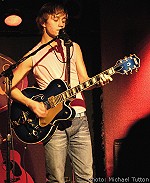
FACE UNFOUND
Sondre plays The Rivoli, Nov 7, 2002. On Toronto's Queen West -- with the blue guitar he bought "just across the street."
Photo: Michael Tutton
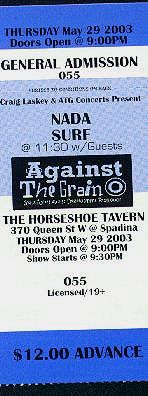
FACE UNNAMED
Ticket for the night of May 29, 2003 at The Horseshoe: "Nada Surf ... w / Guests." Without billing.
I might have found him months before: in November 2002 Sondre had spent four days in Toronto, playing The Rivoli (a shot of him there on his site) and The Senator, best known for jazz.
But I hadn't heard of him then. Now his site told me he was booked again just next door, at Queen West's "Legendary Horseshoe Tavern" May 29, 2003. And at Lee's Palace June 14. I got tickets as soon as I could. If, I found, without his name on them. Or in most ads for those appearances. In some he appeared very small.
I was seeing the protocol of "opening acts," Sondre "supporting" New York boys Nada Surf at The Horseshoe, at Lee's young Brit balladeer Ed Harcourt. (From, I liked seeing, Lewes, Sussex. I've been there: it's where you get off the train to go find Virginia Woolf's Monks House in Rodmell, three miles south).
Lots of people have since heard a great deal about those two gigs. Of the first -- to which I dragged friends Gerald Hannon and Joan Anderson; they turned out more than willing victims -- Jane Rule got this.
-
There was a band on before him, Long Winter from Seattle: the usual rock boys, not awful -- if awfully loud. Gerald [he's into opera] sat them out with a finger in each ear.... He was much relieved when Sondre come on stage with nothing but a guitar. Acoustic, if modestly amplified; he'd later switch to electric -- happy to tell us he'd bought it "just across the street" on his last visit to Toronto.
His CD is full of lush orchestration: would I miss that? But with just that guitar -- and an amazing voice -- the boy filled that room with wondrous sound. Gerald said: "Now that's more like it!" Joan was most taken with his last number: "Night and Day," light and rich.
Joan caught a cab, Gerald climbed on his bike. But I went back, hoping to see if Sondre might come out.... And there he was -- if for quite some time dealing with girls lined up for autographs and snapshots. I stood off to his left, surprised to find myself watching their faces more than his. They glowed. He didn't rush any of them, looked genuinely engaged -- though over Nada Surf's opening number I could barely hear a word he said.
After waiting out that gaggle I got to ask him if he'd ever heard of Red, Hot & Blue. He'd heard a few cuts, mentioning U2's version of "Night and Day." I asked if he had a copy. He didn't. So I told him I'd see him at Lee's Palace and give him one.
I left with: "You're fabulous. Have a good tour." I did wish I'd said instead ("fabulous" feeling fatuous the moment it popped out): "You're a gift."
I later thought of another CD I might make a gift. Sondre is ever on about Bergen's music scene, clearly aware that his art grows not just from himself but from the rich serendipity that can thrive in a "scene." He said in index: "You can be quite touched by what people around you have created."
I thought he might like hearing what people had created in a scene some years before, on a street where I had been touched by lucky chance and Sondre himself had since played: Toronto's Queen West. So I took with me to Lee's not just Cole Porter but the soundtrack of Lorraine Segato's 2001 TV doc, QSW: The Rebel Zone.
Gerald didn't make that June 14 gig. But he did get to hear about it. I was joined there by another recruit: I'd gone on to filmmaker John Greyson about Sondre; he decided to come check him out.
-
I did get to put those CDs into magical Sondre's very hands. And got thanked later. He wasn't quite as dazzling as on the 29th. "I'm not having my best night," he told me, and so it seemed even off-stage: lots of intense running around (he reminded me of How'rd Pope at The Bev in 1978 -- but then the boy's mother was dying and I doubt it was that). Going out for a smoke I found him on his cell phone, pacing the sidewalk -- and (wouldn't you know it) showing the stamp on his hand to get back in.
Still, John was much dazzled, disappointed they weren't selling CDs. I found Faces Down at Sunrise Records today, just $19.99 -- 7 bucks off: "Low Developing Artist Price!" Pretty ironic for a boy miles ahead of the acts he opens for. Ed Harcourt, John & I agreed, was good at what he does -- but what he does just isn't very interesting. "Sensitive singer-songwriter," as he joked.... But I am glad we stayed: he brought Sondre out for one number, and for the encore.
It was touching to see such a smart kid so conscientiously trying not to upstage the lead act: asked for hot guitar riffs he improvised, subtly and standing well back. The boy clearly know his manners.
As for improvising: his guitar leads into songs I know so well did not, this time around, let me tell anyone the title on the first few chords. It was all fresh. I did compliment him on that. He said: "Well, I don't want to get bored." [Or maybe, and more likely, he said "boring."]
My gift package had included a letter. It went on for two pages, in part to explain that second CD -- but mostly so I could say what I'd not had the wits to say two weeks before.
-
I don't mean to gush, but you do seem to me a soul of remarkable -- and deeply natural -- grace. (That's a word worth looking up in your Oxford English Dictionary [which he's said he consults while writing lyrics] for its many rich meanings, some musical.)
And on top of that, phenomenal talent. Your guitar work was stunning ... I was reminded that Jimi Hendrix was once an opening act -- for The Monkees. [Perhaps a faux pas: An early entry in his online diary is titled "Michael Nesmith ist kool." But I can't be sure exactly what he was on about, Sondre diarizing then in Norwegian.]
All by yourself you filled that room with sounds of rich and amazing complexity. And with your rich, subtle, even soaring voice. (I had to smile when you said in index: "I didn't know if I could sing.") What you give does not seem to come from self-conscious "generosity" or a sense of obligation. I think it grows, quite simply, from who you are. And what you love to do.
All of it -- your musical genius, your bigness of spirit, your easy presence as simply you, Sondre Lerche Vaular -- felt to me such a gift.
So, to you: the small gift of these CDs. I don't mean them as gifts given "in return" for yours. In fact, these are your gifts -- if in a different form, coming full-circle.
Gifts go out into the world, cherished by people you may never meet. They get passed around -- as emblems of human connection: all those people enrich the meaning you give your art, your lyrics, your melodies, with meanings of their own. And then, what you give comes back to you. Transformed.
That's what gifts do. They're magic. And so are you.
Well, talk about going on. And I had no idea if he'd ever get a chance to read what I'd written. Five days later I would get the gift of knowing he had. Bill, my brother in Somerville Massachusetts, had first found Sondre in a CD display at a Borders bookstore in New Hampshire -- he too feeling he'd made a nearly secret find.
I'd let him know Sondre was playing next door in Cambridge on June 18. He and his wife Clare arrived early, finding Sondre with Ed Harcourt at the bar (21 by then, but I never saw him drink here, where one can at 19). They talked; they mentioned me, and those CDs. And Sondre said (best I recall from Bill's call the next day):
"That was a very interesting note."
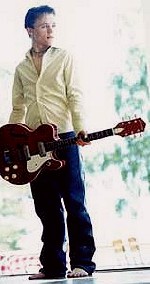

PIGGIES / INNIE
Sondre at his most risqué:
Toes & tummy.





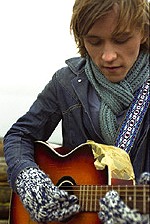

FACE UNBOUND
"I've changed, become another..."
Sondre. In many incarnations.
All photos from
www.sondrelerche.com
But for him apparently playing guitar in mittens (given what I've seen I'll bet he could), from the Royal Norwegian Embassy, London
www.norway.org.uk
"Dear Lerchy Lerchy Hard At Werky," I had opened that note, lifting the title Sondre had given his diary entry of June 2, less than halfway through a six-week tour covering some 30 cities. I ended in avuncular mode:
- I hope your tour's last days don't get too werky. And that you take time to bask in the Bergen scene before you head out on the road again (Tjøme is at least closer to home). Cherish your gifts: May they go on and on. And take care of yourself, so that you too may go on and on. As yourself: always growing -- if ever staying magical Sondre Lerche.
He did look frazzled that night at Lee's. I had wished him that Bergen break then. He told me he planned one, due home on June 24, that gig in Tjøme Norway not until July 16. His next online entry, June 20, read:
- "I hope I don't scare anyone off when I say that I'm very much looking forward to get home. A tour is a strange life, but someone has to live it every once in a while. ... At times when you are down and strung out, falling asleep in your hotelroom, almost the only company you can bare is a sweet record."
He goes on about one ("I get a lot of CDs at my shows. My suitcase cannot take much more!"), given him in Vancouver: "Better Weather" by The Heavy Blinkers, "a fantastic chamber pop record I fell in love with imediately." He gave this entry the title of one of it's "many gems": "I Used To Be A Design."
- "It's one of those songs that has you search for a reason to cry, simply beacause it's so beautiful. Most of the time, you are abel to find a reason, if you look hard enough. I didn't even look that hard."
Among the definitions I have found for "grace" (if not in the OED) is not just "ease and refinement of movement," or as a verb "to give pleasure, to gratify, to delight" -- but "a gift that operates to regenerate and sanctify, to impart strength to endure trial." It does seem Sondre may need it.
Which brings us back (at last) to that face. In fact, to the many faces of Sondre Lerche. And to much else. His Bergen mentors, I imagine, cherish him as both artist and friend; I doubt they'd urge him to anything but the growth of himself, his spirit, and his art. But he does risk being pushed in quite different directions. As his fame grows.
It surely will. After he got back to Bergen his site announced not just another gig in Norway, July 12, but three more in Canada: Vancouver, Edmonton, and Calgary; July 21, 23 and 24 -- opening for Elvis Costello. One of his inspirations. And a lead act truly worthy of his talents (much as he liked Ed Harcourt, even Nada Surf). His next entry, July 8, was headed: "I Am Starting To Function In The Usual Way."
- "Yes indeed. After keeping myself on hold, as I am sure most people touring do while touring, I am now slightly rehabilitated. Six weeks is a long time to be pressing the pause button on the remote control. ... Now that I am home in Bergen, I am starting to look forward to my next departure. That's just how it is."
And a good thing too: his bookers have been busy. Just two days later his site listed 14 more US gigs: from Dallas on August 1 to Pittsburgh on the 27th. On the 30th he's got a date booked in Oslo. I was happy to see that he seems to get all of five days off between Cleveland and Philadelphia. So far, anyway.
Zoinks! I can barely keep up with the boy. I guess I'll just have to trust that he does deeply love what he's doing. And that we will be seeing a lot more of that face.
But which face? "Three Imaginary Girls," a Seattle fan site recruiting him to their "Imaginary Boy Posse" as "a lil' Scandinavian-croonie cutie pie," admitted to not knowing "much about him or his music" -- if assuring potential groupies: "He's not as Edward-Nortonish as his CD cover art would have us believe." His gets lots of such stuff in his website's guestbook.
-
"Sondre, what kind of girls do you like?
what do you look for in a girlfriend?""i want u all to myself. can i rape you please just once"
"you are a flawless performer.
now. let's have wild sex against your tour bus. :)""Sondre if you ever read these things I love!!! You are such a cutie. And i love you, and I would love to 'sleep on needles' with you"
"Can anyone tell me what Sleep On Needles means?"
"you look like your 12"
Well, girls will be girls. (Imaginary ones especially.) Even if Sondre, best I know, doesn't have a bus. One girl wrote thrilled at having spotted him changing his clothes in a parking lot. The only bits of boy-bod that he's willingly shown the world (again best I know) are his guitar-playing arms. And his toes: online and on the back of the liner for Faces Down.
And, just lately, his belly button. Among his site's tour pics is one of him on a hot day in Denver, sitting on the hood of his crew's latest rental car (that crew all of three or four, counting him; sometimes just two): "...He started unbuttoning his shirt and things got badly out of hand...."
Well, not so's you'd notice.
Sondre likely has more to fret from the ostensibly grown-up press. Even that pretty good interview in index blared under his name: "The New Prince of Pop is Norwegian, Twenty, and Single." Big type on the next page read:
- "A singer-songwriter influenced as much by Bacharach as by Beck, this twenty-year-old with the piercing blue eyes has made girls worldwide weak-kneed since the release of his debut, Faces Down, last year."
Sondre is likely glad that blurb mentioned his music at all: media gab-festers ever gush over his age. As he put it in a TV clip: "Oh! He's so young! Hallelujah!"
I imagine he finds his boy-toy status both quite funny (he likes the word "quite") and utterly irrelevant. "Swoon" shows up more than once in his guestbook. And once in his diary: an entry titled "SWOON" -- an album by Prefab Sprout:
- "It's from 84, it doesn't swing, it's angry, it's ambitous and it fails, and it's beautiful. Songs Written Out Of Necessity."
It's the music he cares about. And wants everyone to care about. He's ever on about the work of other artists. Often to gush. On the Beach Boys: "Pet Sounds is surely the masterpiece, but those '70 and '71 albums also have some pieces of master." A rave over Bergen's Absynthe Minded Quartet gets wrapped: "Oh, God. They were good, okay? Describing incredible music is really like dancing about art."
He gets accused of a wonky grasp of English idiom, mostly by Americans pop critics -- those relentless enforcers of colonizing banality. I'd say it makes him a poet. In his lyrics especially. And, I suspect, not quite accidentally.
His site includes not just the lyrics to his songs but their guitar chords. So people can learn to play. For "Don't Be Shallow" (which I've never heard) he ends: "Go out on a G6, and there you have it. Simple as that!" For that he gets guestbook entries likely more gratifying (and yes, his dairy proves he does read them):
-
"what in the world is a Hm chord ive never seen it before and its like in all the songs i wanted to learn from the website"
"am i the first boy inspired by you to shave and wash his socks? with some luck i ll get myself a job and the fourteen bucks i ll need to get into your show in philly. you are my salvation army."
"STUPID SINGERS have two kind of fans (i like simple stupid theories... :-)): stupid groupies and stupid fans. GENIOUS SINGERS have two kind of fans: stupid groupies and genious fans."
Seems geniuses don't always need know their spelling.
Still: how Sondre looks is hardly irrelevant. It was, after all, his face that first grabbed me. And I gladly confess to finding his arms and his toes and his tummy all terrifically captivating too.
I do know, now, that these are not the most gripping bits of this boy's anatomy. His truly telling physical features rarely get into pictures. Not that he hides them; they're just not, to most eyes, photogenic: his fingertips. Callused by years on guitar. They are a sure sign of what Sondre has on offer. But, when I first saw his face, I didn't know that.
I also know now (as he surely knows too) that he's rising fast in a world where his gifts will be wrapped -- for immediate sale -- in how he looks. Or, perhaps more aptly, in his "look." In image. Many people will, in time, find the treasures inside the package. But without the package -- in a world swamped with endlessly hyped and ever-competing packages -- few of us would find his gifts at all.
And, of course, Sondre wants us to find them. He's a generous spirit. But we live in a world where it can be quite hard to just give your gifts away. At least to anyone beyond your own scene. And one does have to make a living -- few artists ever finding the chance to actually live by, not just for, their art.
Like any rising artist, Sondre will be surrounded by forces marshalled to market his art. Or, inevitably, to market "Sondre." They may well pay more heed to his image than his art. That's their job: what he creates they must sell.
In time they may push him to create "art" easy to sell. His retro tastes, his odd lyrics, his "wonky" idiom, quirky edges, zany flights -- his very magic, more apparent live even than on his CD -- may be deemed, well... problematic. Real magic is scary.
Or, maybe worse, it will be turned a marketing hook: tarted up, prettified, hyped as "Magic!" -- sanitized for safe consumption. His handlers beyond Bergen may try to tell him not just how to look, but what to sing. And who to be. Or seem to be: a salable, simulacrum "Sondre."
Who he seems to be now seems to me pretty much who be might really be: a warm and brilliant young man from Bergen, called Sondre Lerche Vaular. (Or, I gather, Sandy.) And, magically, a true artist.
But I doubt he needs to hear any of this. That lovely head seems too level to be quite so easily turned -- but to fresh visions of his own, to shifting senses of who, on any given day, he might hope to be. While still being Sondre Lerche.
From the look of him -- or the many looks of him -- he does seem good at it. Some of his looks clearly come of conscious play. That pipe-puffing gent popped up in Detroit, Ed Harcourt piped too, launching the duo "Fonsworth & Wakefield" -- a road-show romp by two tour-bound artists out to have some fun. It was a passing act; I don't know who was who. But you can still catch it, caught by trusty sound sidekick Alte Sekkingstad, cavorting in a clip on Sondre's site.
Yet I sense in Sondre's many incarnations something more deeply rooted. In that facial architecture, open to such varied readings; in that mind prone to experiment, play, chance finds. And in his big spirit: generous, open to revelations, to endless possibilities. To love. And pain. And utterly unabashed joy.
And that, in the end, may be his saving grace: that "gift that operates to regenerate and sanctify, to impart strength to endure trial." He has that blessed gift of staying himself without staying the same.
Sondre is a shape-shifter. A trickster.
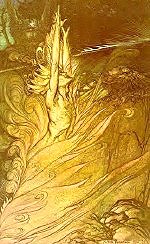
NORSE TRICKSTER
Bad Boy? Or bum rap?
LOKI
I think pronounced "Low-key" (though he surely was not); AKA "Loptr," maybe Richard Wagner's "Loge," called "The God of Strife." "The name conjures up images of a Satan-like deity of evil."
But some scholars suspect this take a later Christian import: Norse myth is less about Good & Evil than a fine balance of forces shifting over time. To many modern Pagans, Loki is a hero.
The Icelandic Eddas, much delved for evidence of Loki's role in the death of Baldr, don't offer much to support his most mythically notorious act.
And hey: someone had to do it. Baldr's wife Frigg -- getting everything in the world to swear not to harm him (mistletoe, alas, too young to understand) -- was, some say, trying to "circumvent the very nature of the universe."
At Ragnarok -- Twilight of the Gods, Wagner's Gotterdammerung -- Loki returns. He slays many and is slain himself.
But Ragnarok, unlike the Biblical Apocalypse, is not the End of the World. Its strife marks a moment of transition: the rise of a new world.
Baldr returns too -- ruling over a new brood of gods born only because he was, for a while, detained off-stage.
The old order, rather a grim lot but for Loki, had forsworn true love (for The Ring!). This new pantheon, Wagner's musical motif suggests, will herald love's bright rebirth.
For more (with links to much more, including the source of the image above), see:
Loki: The underappreciated and misunderstood
A Paean in Progress
http://loki.ragnarokr.com/
pipindex.htm
Writing Angels: Twelve episodes, I felt obliged (lest I seem frivolous) to clearly define my terms. I meant, of course, mortal angels: "flesh and blood and bone (and thankfully)." But I did take a look at god's too (Jehovah's mostly), finding that the word for "angel," in almost every language that has such a word, goes back to a single meaning: "messenger."
- Angels make Visitations, to bring us messages. Usually that's all they do: they drop in for a while... reveal something to us -- and fly away. The angels in these stories, like all we get to see, are mere mortals: human beings, not divine ones. (Not formally, anyway. I do find it salutary to regard humans as divine; it does promote civility.)
By the lights of my personal theology (light-hearted I admit, if far from frivolous), Sondre Lerche more than qualifies: a messenger for sure, divinely human (and very civil); his revelations bestowed upon me in (mostly) just two gigs. And then he flew away. (Well, in time: in the moment he rode off in a rented car.)
But: "Norsk engel?" Norse mythology doesn't have angels (best I know unless one counts Valkyries -- which, I gather, one should not). What it has -- among many divinities, and like many mythologies all over the world from time immemorial -- is a Trickster.
In a review of Trickster Makes This World: Mischief, Myth and Art (by Lewis Hyde, also author of The Gift: Imagination and the Erotic Life of Property -- much on about the gifts of artists; my words in that second letter to Sondre were a potted Gospel of The Gift), Margaret Atwood digs into the meaning of the term.
-
"Coyote and Raven in North America, Eshu and Legba in Africa, the Monkey King in China, Krishna in India, not to mention Brer Rabbit of the American South -- these are a few of the trickster figures whose devious ways Hyde explores. ...
"In every culture that has a trickster god, it's the other gods who have made the various forms of perfection, but it's the Trickster who's responsible for the changes -- the mistakes, if you like -- that have brought about the sometimes deplorable mess and the sometimes joyful muddle of this world as it is.
"And what an ambiguous creature Trickster is! ... He steals fire and burns his fingers. He lives by his wits, yet he falls into traps. He's subversive in that he disrupts conventions, and transgressive because he crosses forbidden boundaries, yet he displays no overtly high and solemn purpose in these activities."
That Norse Trickster is called Loki: "the creature who transgresses all boundaries." Described by scholars as both "pleasing and handsome" and "that rotten little punk," Loki was a shape-shifter. He appears on occasion as a salmon, a fly (or a flea); once as a horse, not stallion but mare: she gives birth to a colt with eight legs.
He's top-god Odin's blood brother -- but other gods claim Odin was clearly drunk that night. He's not, by birth, part of the ruling family: "a member of the club," as one writer put it, if perhaps wondering "whether it was a club worth joining."
Loki is ever tweaking Thor, God of War, but Thor likes hanging around with him anyway: he's funny. Thor has his hammer, Loki "the more powerful, yet more ephemeral, gift of speech." And he's famed for his "indiscriminate sexuality."
He seems the bane of sober Valhalla. But its gods put up with him, sensing they need him. Until he goes too far: in a game where the gang takes playful shots at The Glorious Baldr (son of Odin, so bright he's seen as the God of Light -- and immune to all harm) Loki tricks Hod, Baldr's blind twin, into popping him off with a dart of mistletoe. It's the only thing in the world that can hurt him.
Baldr goes to the Underworld. But he could "return to the living if all things would weep for him." One giantess does not: she's Loki in disguise. The gods have had enough: Loki has shown they can die. They hunt him down and bind him to a rock, wrapped in the entrails of his murdered son. (Not the colt; killed by yet another son, transformed by Odin into a wolf.)
Well. Hardly a "positive role model" (not that I'm fond of the concept). Not even, really, a decent divine model for a mortal if playful pup from Bergen.
Sondre's incarnations remain ever male, and presumably heterosexual -- even as, unlike so many young men, he seems to feel no pressing need to prove he is either one. And Loki was a giant. Sondre is, as he has said, a boy of "wee body." (If taller in life than I'd imagined.) And, for all I know, he maybe grew up Lutheran.
But Sondre is, like Loki, an agent of change. Baldr, for all his brightness, was a bit of a bore: a god of eternal stability. Loki has been called "quite probably the most dynamic figure in Norse mythology."
And, in time, his Bad Boy tricks gave birth to a brighter world.
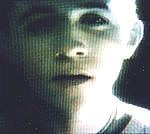

So: Can a rising star really be an Angel? None of my personal Angels was widely known. Some were performers, their names maybe known to people who had barely a clue as to who they might otherwise be (or even if those names were the names their mothers gave them): Strippers in boy-bars. And hustlers.
Some, in their own local way, were stars. But I didn't expect any of their names to ring bells all over the world. As, some day soon, "Sondre Lerche" well may.
But -- perhaps more to the point: Can a rising star stay an Angel? Skyrocketing into a pop firmament populated by little more than posturing flash? Rich with the Sirens' raucous call to flash? And the prize of Dazzling Fame? Well, we'll see. Sondre does, after all, more than deserve whatever fame may be showered upon him.
Still, as you've seen (and he has too, if just briefly), I can on occasion fret the fate of this wondrous young man. Call it my avuncular, even maternal side. A few other Angels have seen not a bit of it too.
But some of those Angels bestowed upon me a wondrous revelation: I had to honour who they really were, who they themselves might hope to be -- not who I might want them to be. I could not shape them. What I could do was be there. With them. And let them be. Even, quite often, let them be without me.
The brightest of that Earthly Choir (he's from Paradise, Newfoundland) once said to me: "I trust you because you've never tried to run my life." He flew away often. If not forever. I had no need to run his life: he is perhaps the most decent mortal being I have ever known (if with ample excuse not to be). His gift, among other gifts, was the gift of honour: true and mutual human respect.
There you have it. Simple as that.
So: I trust ever-shifting Sondre will stay Sondre Lerche Vaular; will go on changing and growing -- but ever be magic. I trust that the gift of his amazing grace will sustain him -- as it, and he, are sustained by the gifts of many mortal angels who clearly do, and will, fill his life.
May he, they, the gods of every bright pantheon -- and everyone else who will surely find him -- ever cherish the magic that is Sondre Lerche.
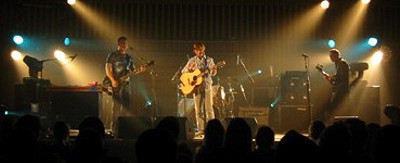

You are free to quote, print, or distribute anything on this site (apart from words & images credited to anyone but me), so long as the source is acknowledged.
All lyrics from Faces Down © 2002 Virgin Records Norway.
All images (but "That Face," shot off a later taped screening of "You Know So Well," or unless otherwise credited) from www.sondrelerche.com. For Sondre's latest gigs, check "Live dates" on that site.
For Margaret Atwood's review, see:
Trickster Makes This World: Mischief, Myth and Art
http://www.web.net/owtoad/trickste.html
My thanks to Gerald Hannon, trading between us music Sondrean & operatic (not to mention synopses Wagnerian) -- both of us, in the end, so amazed.
Finally: Heartfelt thanks to Sondre Lerche, for his generosity in response to my metaphorical (& even mythical) takes on his magical grace.
Go to: Angels: Twelve episodes
Go to: My home page
This page: http://www.rbebout.com/sondre/sondre.htm
July 2003 / Last revised: October 22, 2003
Rick Bébout © 2003 / rick@rbebout.com